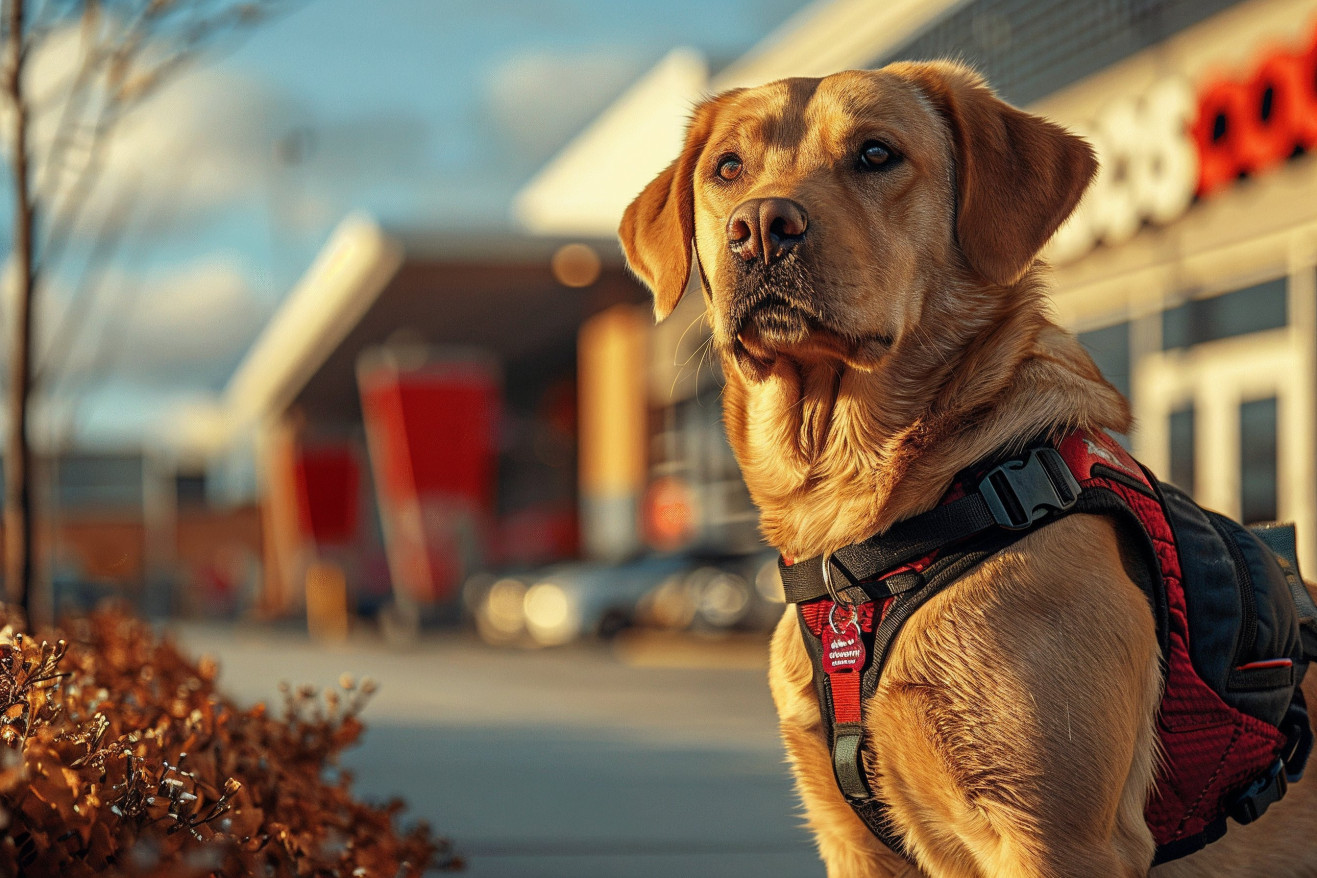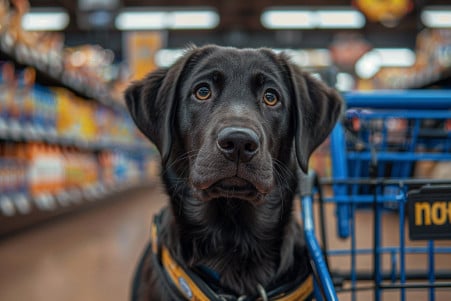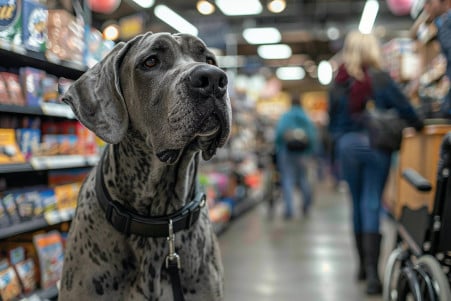Can You Take Dogs to Costco? What You Need to Know About the Store’s Pet Policy
10 March 2024 • Updated 10 March 2024

If you’re planning a trip to Costco, you might be wondering if you can take your dog with you. Costco’s pet policy states that while service animals are allowed in their stores, other animals, including dogs, are not. This is in line with the Americans with Disabilities Act (ADA) and is in place to protect the health and safety of Costco’s customers.
This article will take a closer look at Costco’s pet policy, including the legal definitions of service animals, emotional support animals, and pets, and the rationale behind Costco’s policy.
It will also consider the health and safety concerns that inform these policies and look at consumer preferences and expectations for pet-friendly shopping experiences. This in-depth review will provide insight into the larger context of retail pet policies and how they balance customer preferences and legal obligations.
Can you take dogs to Costco?
What Are Service Animals? Their Rights and Responsibilities
The Americans with Disabilities Act (ADA) defines service animals as dogs that are individually trained to do work or perform tasks for a person with a disability, including a physical, sensory, psychiatric, intellectual, or other mental disability.
Service animals are not pets, and the work or tasks they perform must be directly related to the person’s disability. Service animals are the only animals that are legally allowed to accompany their handlers in all public areas, a right that is protected by the ADA.
This is why service animals are allowed to go into places like Costco; they are necessary for their handlers to live their lives.
On the other hand, emotional support animals (ESAs) and pets are not covered by the ADA and do not have public access rights. ESAs provide emotional support for people with mental health conditions, but they are not trained to perform specific tasks, so they do not meet the ADA’s definition of a service animal, according to the American Veterinary Medical Association (AVMA).
Meanwhile, pets provide emotional support and companionship, but they are not trained to perform tasks to help people with disabilities, so they are not allowed in certain public places.
The difference between service animals and pets and ESAs is that service animals are trained to do work or perform tasks that directly help their handlers. This is why service animals are allowed in places like Costco, where health and safety are important.
The ADA’s rules about service animals make sure that service animals are accommodated while also making sure that people with ESAs and pets don’t bring them into retail establishments, where their presence could be unsafe.
Health and Safety in Retail Environments: Why Service Animals Are an Exception
In the context of allowing animals in retail environments, especially those that sell food like Costco, health and safety are the most important considerations. A literature review in PubMed notes that pets can carry bacteria and parasites, which can be a potential health hazard.
While these hazards have not been directly linked to specific pet-human interactions in retail environments, it is reasonable to assume that these hazards could be a concern for vulnerable populations, such as kids and people with compromised immune systems.
Service animals are an exception to the no-pet policy because the specialized training and behavior requirements for service animals significantly mitigate health and safety concerns. Unlike pets, service animals are trained to act appropriately in public settings, which includes being clean and not causing a disruption. These requirements ensure that service animals are safe and clean in the environments they visit.
Costco’s policy demonstrates a commitment to ensuring that all customers are safe and healthy in their stores. The requirements for service animals are in line with Costco’s strict health and safety policies, which ensure that everyone can shop in their stores without worrying about their well-being. This careful line of thinking respects the needs of people with service animals while also protecting public health.
Meeting Customer Needs While Maintaining Business Goals
The American retail landscape is changing, and the rise in pet ownership has led to an increase in customer expectations for pet-friendly retail spaces. TGM’s research found that more people are taking their pets with them when they leave the house, and this has led to a demand for more pet-friendly retail options.
Meanwhile, the American Pet Products Association’s survey found that the pet industry is booming, and pet owners are continuing to spend on their pets even during times of economic hardship.
Retailers have taken note of these trends and are working to meet the needs of pet owners by offering pet-friendly shopping experiences in the hopes of attracting a wider range of customers and increasing sales.
However, the needs of pet owners must be balanced with the needs of the business and the overall customer experience. While allowing pets in stores can improve the shopping experience for some customers, retailers like Costco also have to consider the impact on the overall shopping experience and business operations, including health and safety concerns and the impact on other customers.
As we think about the impact of these consumer trends, it’s important to understand the delicate balance retailers must strike. While offering pet-friendly shopping experiences may be appealing, retailers must also consider their responsibility to provide a safe, regulated, and welcoming shopping experience for all customers, which often means adhering to strict health and safety regulations that may not always align with the wants and needs of pet owners.
How to Work Within the Legal and Regulatory Frameworks
Federal and state regulations provide the legal context for animals in retail, particularly in food retail. The ADA requires that public accommodations at the federal level allow service animals because they are trained to perform tasks for individuals with disabilities, which is the basis of Costco’s policy. The ADA also defines service animals and sets specific standards for their presence in places of public accommodation, according to ZenBusiness.
Local health codes and ordinances are also important, as shown by the Texas Food Establishment Rules, which Sugar Land, TX’s official website cites as an example, that allow service animals in eating establishments and provide guidelines for dogs in outdoor dining areas. These state laws often work in conjunction with federal laws to specify when animals can be allowed in different public places.
Costco and other businesses need to work within these legal and regulatory frameworks while also considering their operational needs to ensure that they can follow the rules while still running their stores effectively.
This means that businesses need to work within the regulations to make sure that they can accommodate service animals while still meeting health and safety standards, which will allow them to meet the requirements of the law while also keeping their customers safe.
By following these rules, retailers like Costco can make sure that they continue to put the safety and convenience of all of their customers first.
How to Work With Costco’s Pet Policy
In summary, Costco’s pet policy is based on a strong commitment to health and safety and the requirements of the Americans with Disabilities Act (ADA). While service animals are allowed in the store to help their owners, the company’s pet policy, which includes emotional support animals, is based on the ADA’s guidelines and Costco’s service animal policy.
Costco has put this policy in place to ensure the safety and well-being of its customers by reducing the risk of allergies, phobias, and sanitation issues in a retail environment that includes a food court.
As we’ve seen, the increase in pet ownership has led to a demand for pet-friendly spaces, but retailers have to balance this demand with health codes and the need to run a profitable business. Costco has struck this balance by making sure that people who use service animals are accommodated while maintaining a clear and consistent policy for the general public.
It’s important for consumers to know the pet policies of the retailers they plan to visit. Costco encourages customers to contact individual stores or consult the company’s online resources for the most up-to-date and accurate information, as noted in the company’s statement. By doing this, consumers can help ensure that everyone, including those with service animals and those without, has a good shopping experience.


